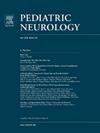Efficacy and Safety of Rituximab Treatment for Anti-N-Methyl-d-Aspartate Receptor Encephalitis Without Tumor in Children
IF 3.2
3区 医学
Q2 CLINICAL NEUROLOGY
引用次数: 0
Abstract
Background
To evaluate the efficacy and safety of rituximab treatment for anti-N-methyl-d-aspartate receptor (NMDAR) encephalitis without tumor in children.
Methods
Eighteen pediatric patients with NMDAR encephalitis treated with rituximab after failure of intravenous immunoglobulin (IVIG) and methylprednisolone treatment were analyzed retrospectively in terms of their medical history, clinical features, laboratory examination results, and treatments. The modified Rankin scale (mRS) score, peripheral blood CD19+ B cells, recurrence, and adverse events were used to evaluate the efficacy and safety of rituximab.
Results
The patients were treated with rituximab 3.2 ± 1.0 days after the end of IVIG and methylprednisolone treatment. After initial rituximab treatment for four weeks, the mRS score and number of CD19+ B cells in all patients were significantly lower than those before treatment (P < 0.05). At the last follow-up (44.1 months, 17.7 S.D.), all patients had recovered well (mRS ≤2), 14 patients (77.8%) recovered completely (mRS = 0), three patients had recurrent seizures, and one patient had mental and language impairment. Two patients had transient mild adverse events during infusion, and none of the other patients experienced severe adverse events during hospitalization or follow-up.
Conclusions
Rituximab appears safe and may be effective for the treatment of anti-NMDAR encephalitis without tumor in children refractory to first-line agents.
利妥昔单抗治疗儿童无肿瘤抗 N-甲基-d-天冬氨酸受体脑炎的有效性和安全性
背景评价利妥昔单抗治疗儿童抗N-甲基-d-天冬氨酸受体(NMDAR)脑炎(无肿瘤)的疗效和安全性。方法回顾性分析18例儿童NMDAR脑炎患者的病史、临床特征、实验室检查结果和治疗方法,并对静脉注射免疫球蛋白(IVIG)和甲基强的松龙治疗失败后接受利妥昔单抗治疗的患者进行分析。结果患者在结束 IVIG 和甲基强的松龙治疗 3.2 ± 1.0 天后接受了利妥昔单抗治疗。初始利妥昔单抗治疗四周后,所有患者的 mRS 评分和 CD19+ B 细胞数量均显著低于治疗前(P < 0.05)。最后一次随访(44.1 个月,17.7 S.D.)时,所有患者均恢复良好(mRS ≤2),14 名患者(77.8%)完全恢复(mRS = 0),3 名患者癫痫复发,1 名患者出现精神和语言障碍。结论利妥昔单抗对一线药物难治的儿童抗 NMDAR 无瘤脑炎的治疗似乎安全且有效。
本文章由计算机程序翻译,如有差异,请以英文原文为准。
求助全文
约1分钟内获得全文
求助全文
来源期刊

Pediatric neurology
医学-临床神经学
CiteScore
4.80
自引率
2.60%
发文量
176
审稿时长
78 days
期刊介绍:
Pediatric Neurology publishes timely peer-reviewed clinical and research articles covering all aspects of the developing nervous system.
Pediatric Neurology features up-to-the-minute publication of the latest advances in the diagnosis, management, and treatment of pediatric neurologic disorders. The journal''s editor, E. Steve Roach, in conjunction with the team of Associate Editors, heads an internationally recognized editorial board, ensuring the most authoritative and extensive coverage of the field. Among the topics covered are: epilepsy, mitochondrial diseases, congenital malformations, chromosomopathies, peripheral neuropathies, perinatal and childhood stroke, cerebral palsy, as well as other diseases affecting the developing nervous system.
 求助内容:
求助内容: 应助结果提醒方式:
应助结果提醒方式:


